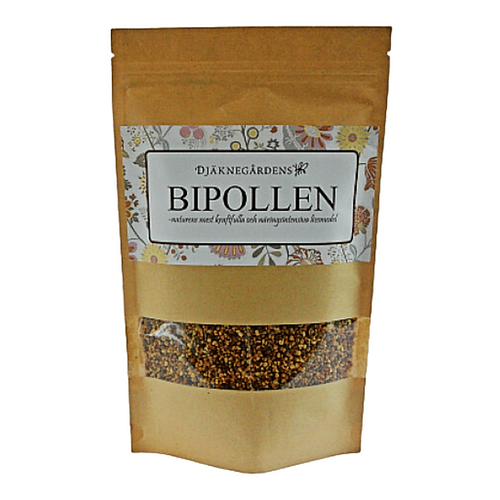Bee pollen 75g
Already in ancient Egypt, bee pollen was placed in the tombs of the pharaohs to provide nourishment for the next life. In China, it has been used for medicinal purposes for thousands of years and already 500 years ago, Hippocrates, the "father of modern medicine", wrote about bee pollen in his books.
The bees collect pollen from flowers and trees and transport it to the hive on their hind legs, so-called pollen pants.
Scientific experiments have shown that bees want as much variety as possible in their pollen and therefore collect this from as many flowers and trees as possible rather than from a single plant variety.
Pollen is the bees' most important source of nutrition, but is also a fantastic nutritional supplement for us humans.
Pollen always changes in taste and color depending on which flowers the bees have visited and when in the season the visit took place.
Adequate Dose
As a dietary supplement: 1 heaped tablespoon/day.
As a therapeutic agent: 2 heaped tablespoons/day.
Children: Half the amount.
Properties of Pollen
Antioxidant
Antibacterial
Anti-inflammatory
Dietary supplements
Protein supplements
Counteracts prostate problems
Counteracts Anemia
Prevents osteoporosis
Counteracts pollen allergy.
Bee pollen contains
(mg/100g)
Vitamin A (carotenoids) 1-20 mg
B vitamins (B1, B2, B3, B6, B12)
Vitamin C 7-56 mg
Vitamin E 4-32 mg
Phosphorus 80-600 mg
Iron 1.1-17mg
Calcium 20-300 g
Potassium 400-2000g
Copper 0.2-1.6 mg
Chromium 0.03-42 mg
Magnesium 20-300 mg
Manganese 2-11 mg
Molybdenum 0.1-4.6 mg
Selenium 0.05 mg
Zinc 3-25 mg
Protein 2.5-62g/100g/
Amino acids 108-288 mg/g
pollen- 22 pcs usually
Dietary fibers
Phenols
Organic acids
Our bee pollen is of the highest quality. Origin Europe.

 Deutsch
Deutsch
 Español
Español
 Français
Français
 Italiano
Italiano
 Polskie
Polskie


